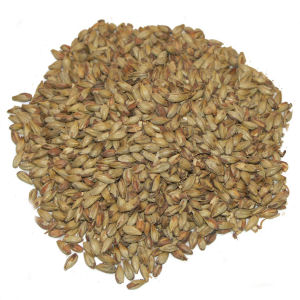Victory malt has always intrigued me. Maybe it’s the name. I guess I feel like I would be “winning” if I used this malt in my brews. I did a little research and thought I would combine all the information into some kind comprehensive overview.
This malt’s creation is American in origin. I believe that refers to the process to make Victory malt was developed here in the USA.
The processing is different than the processing a maltster would use to create, for example, a caramel malt. It’s this special processing that gives the malt it’s flavor.
Flavor: Imparts a “toasty” character to beers.
- Nutty taste
- Biscuity
- Baking Bread
Color: 25 – 28 Lovibond. Colors described from sources I discovered ranged from slight red to amber to orange highlights. I guess it depends on how much you use.
Body: Improves body and head retention.
Use: The malt has no diastatic power so you can use it as a steeping grain. Because of the flavor it imparts, Nut brown ales are a good candidate for this malt. I think it would be a good addition to dark beers, especially a porter. If you wanted to make an American Brown Ale and stay on theme, Victory malt would be a good addition. Probably no more than 20% of your grain bill.

Learn more about other specialty malts:

Mike
I used this recently in the ESB I brewed. I think of this malt as an American substitute for Biscuit Malt produced in the UK.
Travis
Great posts! I am a big fan of your in depth look at each of these ingredients. Keep it up!
Ted
Victory malt is very similar to Biscuit. In greater amounts it will definitely give rich toasty and nutty flavors and aromas. I used 1 lb Victory for the first time in a Nut Brown Ale this past Fall. I really like how it came out. I invite you to check out that post (T&C Nut Brown Ale). I agree with Travis, you have nice content here. I look forward to coming back.
nick
I use a small amount (1/2 lb) along with a crystal malt in my extract IPA, just enough to add a great color and nutty complexity. I love it
jeffinpa
“I guess I feel like I would be “winning” if I used this malt in my brews.” – I wonder if Charlie Sheen uses this as a breakfast cereal.
Nice write-up. I’ll keep it in mind for a nut brown or a “nutty” lager…
jeffinpa
BTW: john Palmer disagrees about it being “steep-able”: http://www.howtobrew.com/section2/chapter12-1.html Apparently, it should be mashed.
John
Funny – I wrote that winning line over 3 years ago. Charlie Sheen must read the blog. Anyway, Victory malt is a weird one. I have seen this debate on a lot of forums and this post is quoted as a reference. I think homebrewers have had success just steeping a pound in a recipe – but are they really just doing a mini mash? Let me research this more.
jeffinpa
Thx for the reply – I know this way pre-dated Sheen, which is why I took notice of the line and thought it was funny…
Anyway, I’d be interested in hearing what you learn, as I’m not an AG brewer yet, so I only use “steepable” grains. A partial mash may be a possibility though.
Sgt. Shultz
Victory = Winning!
Dewy Zillamesh
Sgt. Shultz’s Grow Up Ale
4.02 Briess 2 – Row
.102 Roasted Barley
.125 80 L
.09 Victory
.210 Torrified Wheat
2 Gallon Batch. Couldn’t be too big a size for acting cartoonish.
Brau Cow
One pound or less in a 5-gallon wheat IPA recipe is also useful to bridge the flavor-profile gap between the hops and the wheat; a great specialty malt.
John
Great tips!